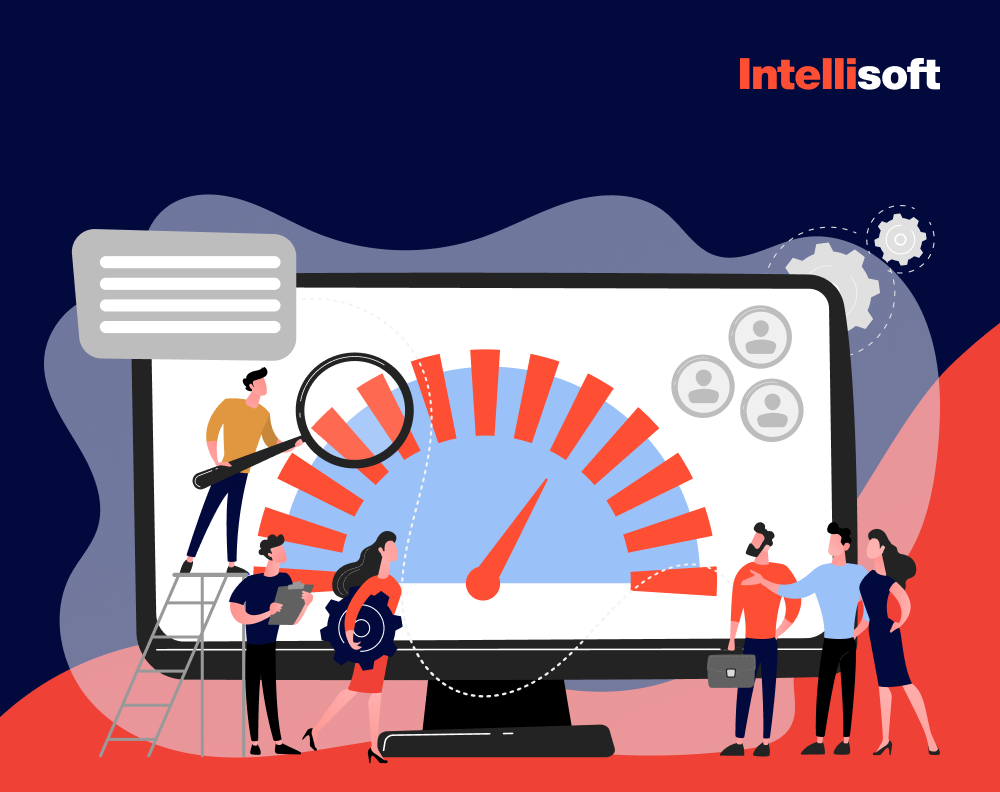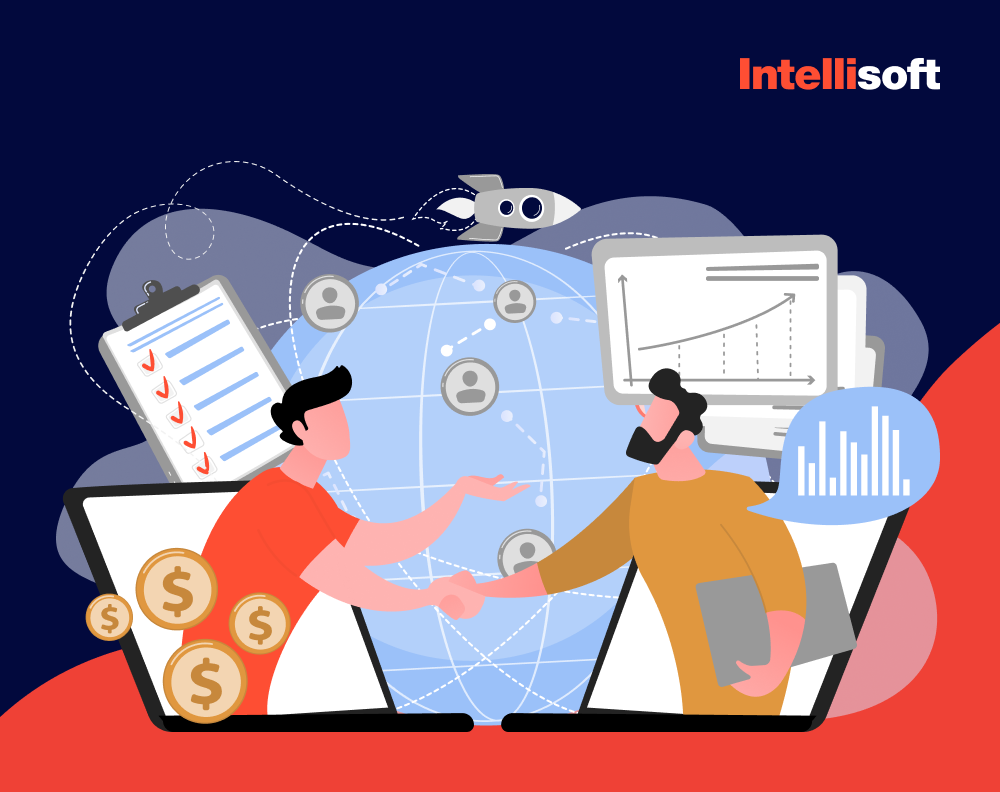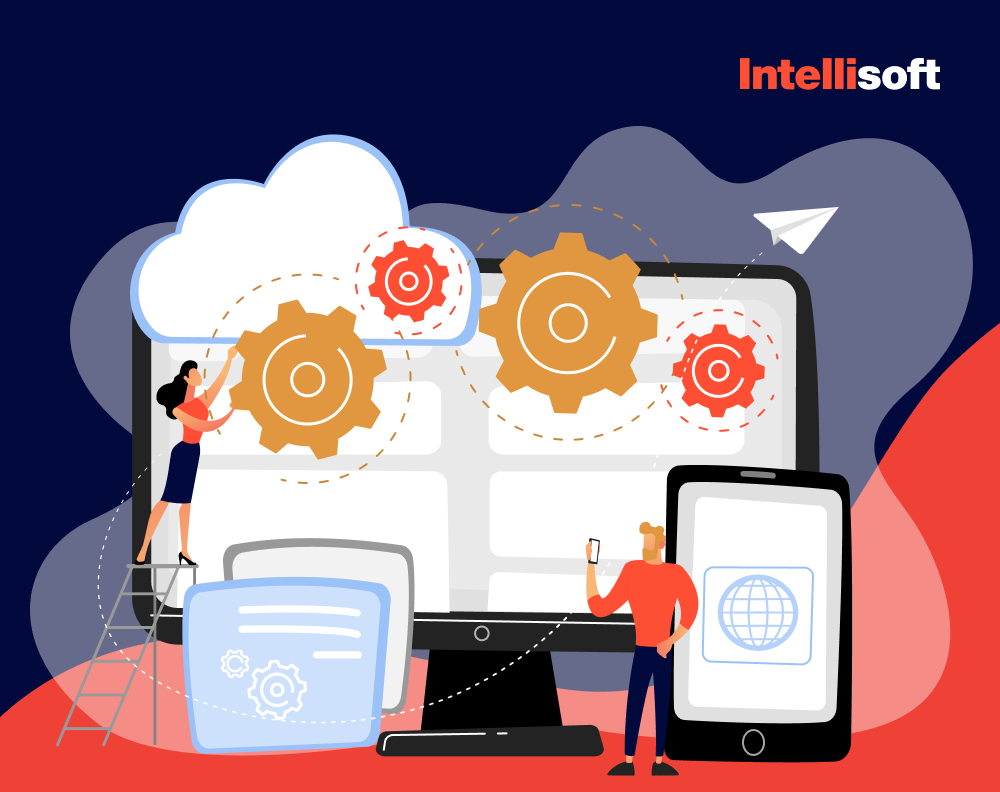Welcome to the dynamic world of technology, where familiar words like “bugs,” “cookies,” and “sprints” have unique and specialized meanings. Here, the comparison of coder vs programmer goes beyond simple job titles—they represent distinct roles crucial in the tech industry. Grasping these differences is particularly important for managers who are new to this field, as understanding these nuances can prevent the misalignment of skills and job roles.
Although people often use the terms programmer vs coder interchangeably, there is a significant difference between the two. Programmers focus on the logical structure and design of a project, carefully planning the pathway to the final product. Coders, on the other hand, take these plans and convert them into executable scripts that computers can understand and process. Both roles are essential in creating successful software, with each bringing unique skills to the table.
So, what distinguishes a coder from a programmer, and how do you determine which one your project requires? This guide aims to clarify these roles, highlighting the unique contributions each makes to a software development team. By the end, you’ll have a better understanding of whom to hire, bringing your next tech idea to life.
Table of Contents
What Is a Programmer?
In software development, a programmer is much like an architect. They don’t just build; they envision and innovate throughout the development journey. These strategists and visionaries shape complex software systems, blending their coding prowess with critical problem-solving and design skills.
Fluent in numerous programming languages, programmers exhibit remarkable adaptability, navigating effortlessly through Python, Java, C++, and more. Their responsibilities are diverse and expansive:
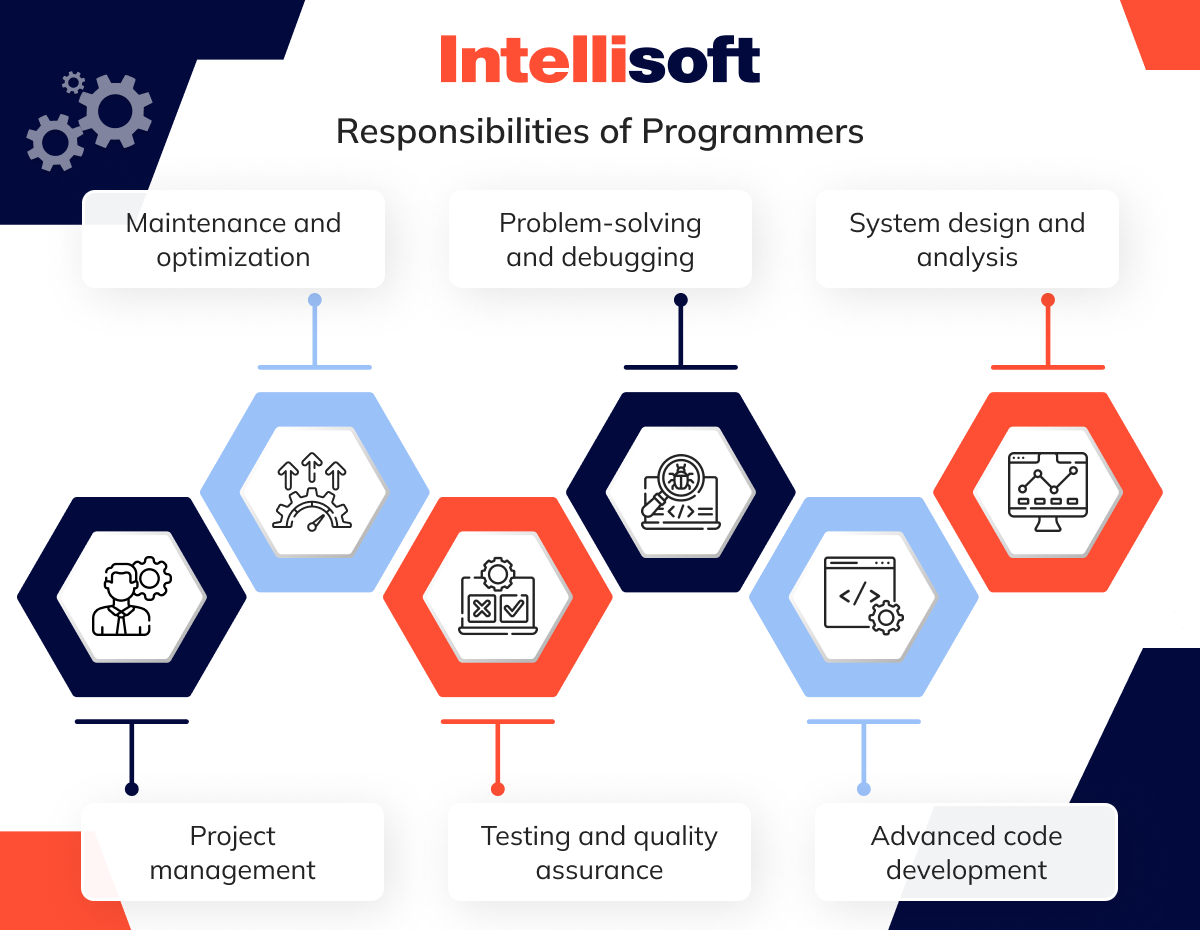
- Project management. Guiding the development process and making pivotal strategic decisions.
- Maintenance and optimization. Boosting software performance and integrating new features after deployment.
- Testing and quality assurance. Ensuring the software meets high-quality standards and specifications.
- Problem-solving and debugging. Addressing complex issues and refining code functionality.
- Advanced code development. Creating sophisticated algorithms and data structures.
- System design and analysis. Designing the software’s architecture and evaluating project requirements.
What Is a Coder?
A coder meticulously translates the visions and designs of others into operational software, much like a craftsman bringing blueprints to life. In code, these artisans turn abstract concepts into functional programs using languages such as Python, Java, HTML/CSS, JavaScript, and SQL.
Coders often specialize in a particular programming language, excelling in tasks that are foundational yet straightforward. They are typically the first touchpoint in the software creation process, focusing on several key areas:
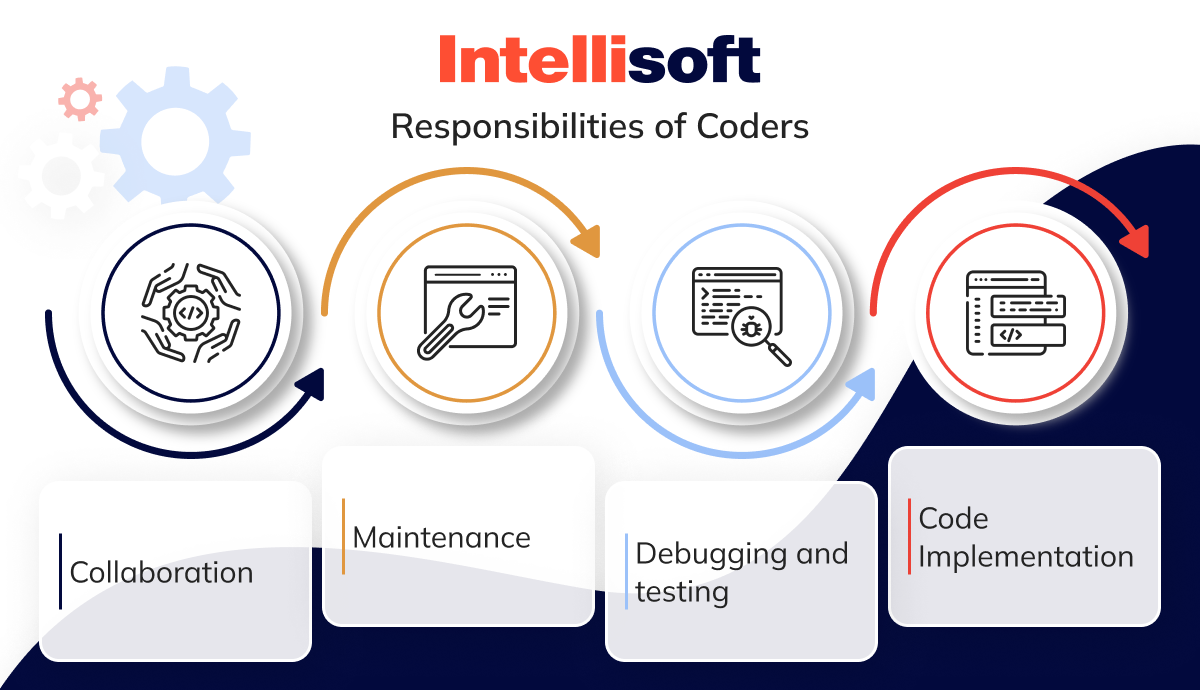
- Collaboration. Coders work synergistically with seasoned developers or project managers, aligning their contributions with the overall project vision.
- Maintenance. They update and refine existing software to adapt to evolving needs.
- Debugging and testing. Coders identify and fix code issues, ensuring the software operates smoothly.
- Code Implementation. They translate requirements and designs into functional code, turning ideas into executable programs.
Programmer vs Coder: What are the Differences
If you want to hire the right coder or programmer for your development team, it’s crucial to understand each one’s distinct roles and skills.
One key difference between a computer programmer vs coder is the scope of their responsibilities. Coding involves translating programming languages into efficient, error-free code to perform specific tasks, whereas programming encompasses the design, logic, and flow of the entire codebase. Essentially, coding is a subset of programming; all coding is part of programming, but not all programming involves coding.
Coders focus on writing code. Their main task is to input scripts into a product, ensuring the processor executes the required commands without delving into the broader aspects of product design.
To be a proficient coder, one must be fluent in programming languages. Whether it’s a functional language like SQL or an object-oriented language like Python, coders need to master the syntax, commands, classes, and basic logic of at least one language. Their responsibilities typically include:
- Testing
- Debugging
- Quality analysis
- Code optimization
- Utilizing existing language libraries to avoid redundant coding
Many coders specialize in one language, but due to similarities between languages, some become proficient in several. To ensure you hire top-quality talent, leverage coding assessment tools to evaluate an applicant’s expertise in their chosen language.
Related articles:
- How to Extend Your Software Development Team
- A Guide on How to Recruit Software Developers: Outsource Coders vs. Freelancers
- Software Architect vs Software Engineer: Core Differences
- 11 Software Developer Soft Skills Every Programmer Needs to Succeed
- Who Does What? Understanding Roles in a Software Development Startup
Key Differences Between a Coder vs Programmer
If coders write code and programmers plan products, it’s easy to see why there might be some confusion between the two roles. However, there’s a significant amount of overlap. For instance, both coders and programmers need a solid understanding of a language’s logic to ensure that their final code can be tested and debugged. Coders must be fluent in their chosen language, and programmers often share this requirement. The shift from the title “professional coder” to “junior programmer” or “junior developer” further blurs the lines.
What are the differences of coders and programmers in software development? Let’s explore them.
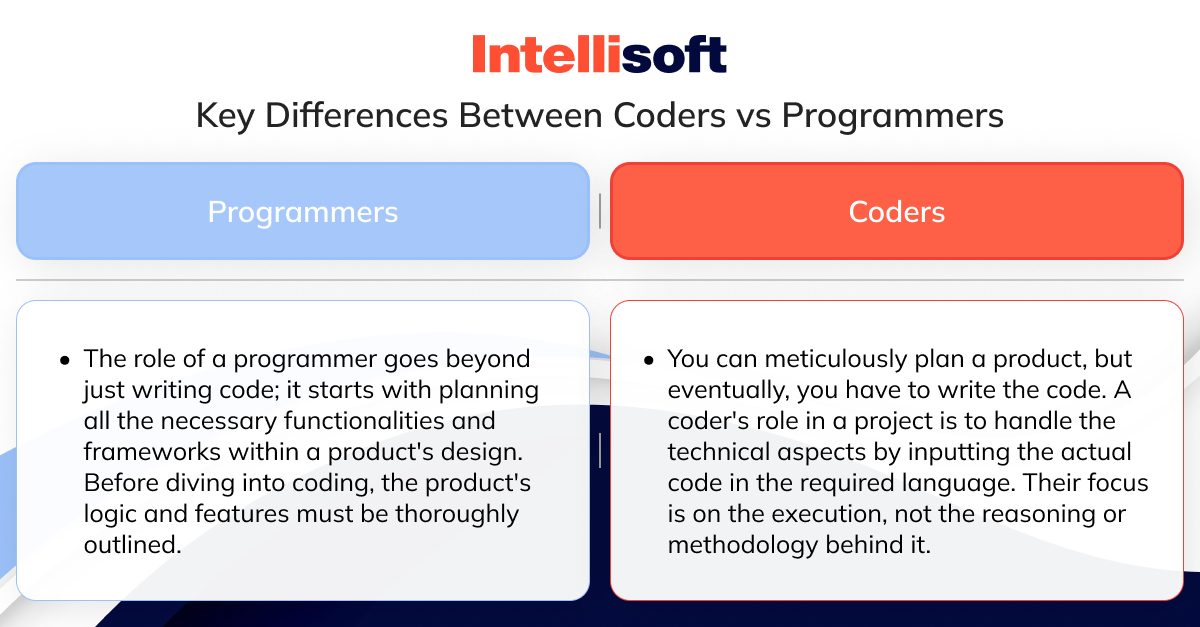
Programmers
The role of a programmer goes beyond just writing code; it starts with planning all the necessary functionalities and frameworks within a product’s design. Before diving into coding, the product’s logic and features must be thoroughly outlined.
Take, for instance, a data-mining app designed to scrape the web for specific statistics and organize them into designated categories. Before touching a keyboard, a programmer might draft a neural network blueprint that directs data into separate repositories, with actions to be performed on the data thereafter. This process requires coding knowledge, but the primary task for a programmer is to plan how the product will function meticulously.
Coders
You can meticulously plan a product, but eventually, you have to write the code. A coder’s role in a project is to handle the technical aspects by inputting the actual code in the required language. Their focus is on the execution, not the reasoning or methodology behind it.
For instance, once the data-mining app is outlined—and at various stages during development—the coder’s task is to input the script to make it operational. They might write their own code or use a module from the language library to accomplish the task, testing, and debugging as they go. Coders are so focused on compiling machine code that they might not even know the specific function of the snippet they’re writing; their job is simply to code.
The Skills Needed
Coders and programmers each have distinct roles, which require them to develop unique skill sets. While some of these skills are honed through specific training, others stem from inherently different ways of thinking.
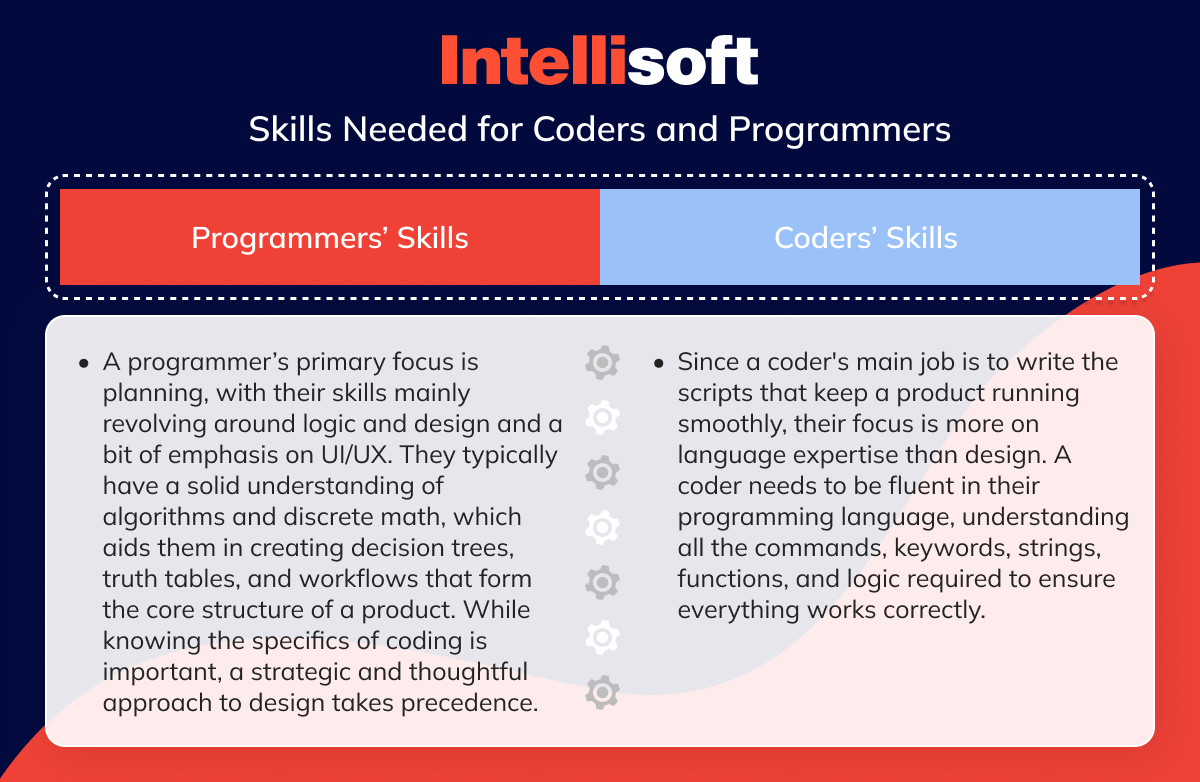
Programmers’ Skills
A programmer’s primary focus is planning, with their skills mainly revolving around logic and design and a bit of emphasis on UI/UX. They typically have a solid understanding of algorithms and discrete math, which aids them in creating decision trees, truth tables, and workflows that form the core structure of a product. While knowing the specifics of coding is important, a strategic and thoughtful approach to design takes precedence. This is why many programming courses emphasize developing these skills before introducing any actual coding.
Coders’ Skills
Since a coder’s main job is to write the scripts that keep a product running smoothly, their focus is more on language expertise than design. A coder needs to be fluent in their programming language, understanding all the commands, keywords, strings, functions, and logic required to ensure everything works correctly.
A skilled programmer should be capable of writing clean, straightforward, and reliable code. They should also be adept at testing and debugging and know where to find templates from libraries and coding communities to speed up their work. Additionally, knowing how to optimize and organize code is crucial. Soft skills like organization and attention to detail are also invaluable.
The Tools Used
Having unique roles and skill sets means that coders and programmers often rely on different tools for their work, although there’s some overlap in what they use.

Programmers’ Tools
Since programmers need to outline the framework of their projects skillfully, they rely on various tools to help them implement their devised workflows. Some of the most common tools programmers use include:
- Text editors
- Agile development frameworks
- Wireframing tools
- Productivity trackers
- Platform-as-a-service (PaaS) apps
- Databases
While their language proficiency means they might use some of the same tools as coders, programmers primarily utilize apps that assist in planning and tracking their projects throughout the design journey rather than executing code.
Coders’ Tools
Since coders are responsible for creating high-quality scripts, they rely on tools designed to help them translate commands accurately and efficiently. Some essential tools coders use include:
- Source code editors
- Compilers
- Interpreters
- Debuggers
- Profilers
- Libraries
- Online communities
- Coding automation solutions
- Low-code/no-code platforms
Efficient task management is crucial for coders and programmers, so they often utilize productivity trackers and agile development frameworks. However, the primary software tools in a coder’s toolkit assist in writing clean, efficient code.
Deciding Which One You Need for Your Projects
When planning to hire for your project, how do you decide between a coder, a programmer, and a developer? According to Zippia, the Department of Labor estimates that hiring the wrong employee can cost up to 30% of their annual salary, or even more, making it crucial to get the right fit. Here are some key considerations to help you choose the right talent:

- Skills. Ensure your candidate has the necessary skills to contribute effectively. Testing their competencies can reveal if they are equipped to handle your project’s demands.
- Scope. Clarify your needs—do you require a coder to write or test scripts, a programmer to design the app’s functionality, or a developer to manage the entire process? Defining this will streamline your hiring process.
- Tools. Identify the tools your new hire needs to be proficient in. Their experience with your current tech stack will be vital for their success.
Conclusion
Navigating the tech industry’s complexities is no small feat, especially when finding the right talent. That’s where IntelliSoft comes in. As a distinguished software outsourcing company, we specialize in connecting you with top-tier developers and programmers perfectly suited to your project’s needs. With a vast global network, we ensure you access the best software development expertise available. Whether you need a single specialist, a dedicated team, or a full R&D center, IntelliSoft is your gateway to scaling your development capabilities efficiently.
Contact us today and see how our tailored solutions can transform your project and drive your success forward.


